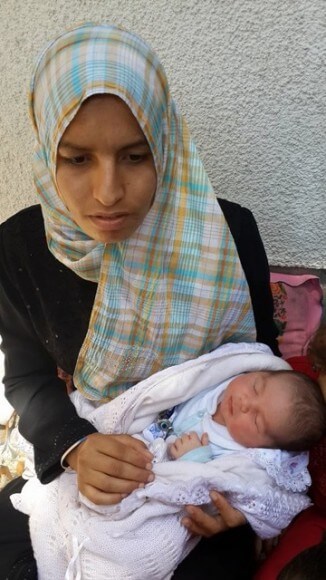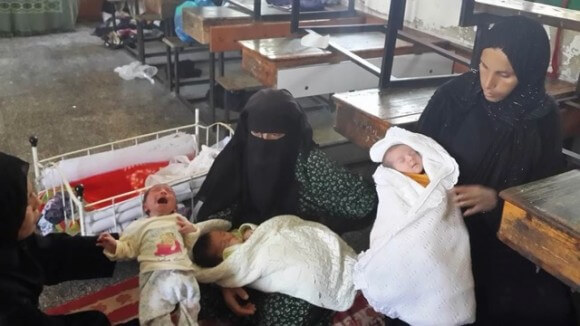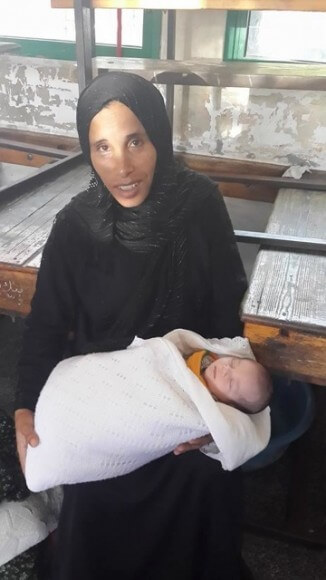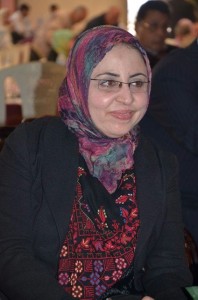
To be a woman living a war of terror, with an unborn child, holding on to your two young daughters, surrounded by death and fire consuming what remains of your humble house. To be a woman and live through that can only mean you are a Palestinian surviving the most recent massive attack on Gaza.
To be a woman barely twenty seven years old, with dark fears spinning around your head, your house is not safe, your little daughters cannot stop crying and screaming from the sound of bombs, you only know that you’re alive now after being on the edge of life and death for days in a row; it can only mean you are an exceptional woman on this earth.
To feel all this fear and horror, knowing that any second you might give birth with no one by your side: not your mother, your family, your friends or a doctor, to feel all this on top of being a refugee in your own country….
To run more than three kilometers in the dark, between the rockets and the scattering shrapnel that turn night into light by fire, to breathe the scent of destruction every second of every day, houses burnt down to the ground, trees no longer stand, you cry and you cry, because the worst feeling of all is being powerless, so helpless you no longer know what to tell your children. Living through all this and surviving means you are born of light because only a guardian angel could enable someone to withstand this; it means you are a Palestinian woman, under the indiscriminate bombing of the Israeli forces, and you’re still surviving…

Reham Shiekh Al-Eid, twenty-seven years old and pregnant in her last month, resides in Zalata to the east of Rafah. Every day the scent of death from Israeli bombing came closer and closer and made it impossible to reach a hospital for a check-up on her unborn child.
Reham said, “The shrapnel wrecked my house, which has no roof, only a zinc cover (a very weak metal that can barely stop water from dripping). Every time an Israeli strike took place, the whole house shook and I thought it may just fall to pieces. The gunfire was even scarier; I felt that death might arrive at that moment. I feared for my family the most and my pregnancy made every second stressful because any minute I might go into labor. That is when my husband and I, my two daughters and some neighbors, decided to take the risk; we collected some clothes and just left without looking back. We start running; it was barely dawn, but the sky was bright from the death lights of the Israeli rockets. I carried my youngest daughter, while my husband carried our second daughter, despite his serious leg injury. We ran for a long time, literally running for our lives. We kept screaming and crying, but eventually we made it to Al-Awda School, a shelter * for people whose homes are no longer safe.”

“It was just then that I felt a lot of pain in my stomach. I have been through labor before and I knew what was coming,” Reham continued. “My husband started to panic. We needed to get to the hospital; it was 6:30 am. Simply by chance, we met a helpful man who agreed to take us to the closest hospital (Al-Emarati) where I gave birth to my son, Mohammad.”
Reham’s voice fades as if she can barely speak. “Our survival was a miracle, but I lost a lot of blood and had to stay a day in the hospital. The next morning I returned to the shelter with nothing to give my newborn.” Wracked with sobs, she said, “We left our money, clothes, we don’t know what happened to our house. Now we’re living with thousands of people on the floor, with nothing to give our children. My newborn son is one day old and sleeping on the floor right next to me. I’ve been wearing the same clothes I left the hospital with. I didn’t even have clothes for my newborn son; luckily they gave us some basic supplies to keep a newborn alive: some diapers and a few items of clothing.”
Reham’s husband, Ayman Shiekh Al-Eid, said: “My wife suffered the indescribable, living under weeks of non-stop bombing knowing her labor could start at any moment, while fearing for me, our daughters and the whole chaotic situation. My wife kept asking me how she would survive giving birth in such horrible circumstances, not being able to recognize day from night. Merely standing one meter from our doorstep was a serious risk, I felt so powerless, so helpless as a husband, unable to answer my wife’s questions about how we could survive and that is why we took the risk and came to the shelter; because we knew nothing and could do nothing. The situation here is better, although the facilities are limited. I thank the shelter and all those working in it, but they cannot meet the needs of a woman who has just given birth. The toilets are not near and queues are long. She has lost blood and needs rest for a stable recovery. I stay next to her because that’s what she needs the most right now.”

Mo’een Al-Hour, the manager of the shelter, gave a statement about the circumstances in which Reham and others are living in that shelter: “This school has over 4,000 people sheltered in it. Reham’s family is in a room with just 32 other occupants, but in other sections of the shelter there are 70 to 80 people in a single room. There are over 700 children below the age of two in the shelter and it is getting harder and harder to supply basic items like milk, towels and diapers.” Mo’een expressed gratitude to those who established and maintain the shelter, who are not acting in an official capacity like UNRWA, because the number of people without homes is too overwhelming to be handled by one single organization.
The birth of Mohammad Sheikh Al Eid is a symbol of hope in these difficult circumstances. Between the death and destruction, joy came as a beam of light to those who are reminded of death second by second, a reminder that joy and life goes on.
*The shelters in Rafah referenced in this article are all run by United Nations Relief and Works Agency (UNRWA)


>> To be a woman living a war of terror, with an unborn child, holding on to your two young daughters, surrounded by death and fire consuming what remains of your humble house. To be a woman and live through that can only mean you are a Palestinian surviving the most recent massive attack on Gaza.
It’s a pity she’ll never understand just what a grandson of a Holocaust survivor goes through.
Gabor Mate, fantastic doctor an amazing human being, who is best known for providing care to dispossessed, and addicted in Canadian slams, when he was reminiscing about his own early years in the war in Europe, he said he remembered his mum telling that she went to see the doctor and told him that her child keeps on crying, the doctor said “all my Jewish children are crying” their mothers as stressed and unsure of future. Mate went on to describe the enormous damage to emotional health, personality development, inability to relate to others, that come from such early tragic experiences. He was not providing exceptionalism excuse for Jews, or Israelis . He was making a universal humanist point that everybody whose childhood has been damaged will struggle for the rest of their lives.
i read in twitter 4500 babies had been born in gaza in the last month. that’s a lot of mom’s giving birth with bombs crashing everywhere.
The most heartrending story I heard was from (I think) a young woman medic returning here, interviewed on radio. A heavily pregnant young (21 or 22) woman was wounded by shrapnel, and her unborn baby was killed by it (severe head injuries). She needed extensive surgery and was being medevaced when they met, but the baby’s death saved her life – had she not been pregnant, the shrapnel would have hit her organs. She was described as terribly traumatized.